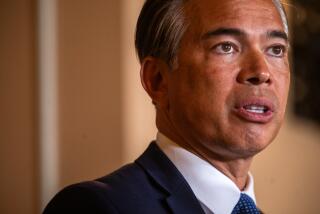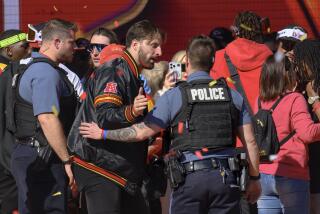Holder visits Ferguson as grand jury hearings begin
Reporting from Ferguson, Mo. — U.S. Atty. General Eric H. Holder Jr. visited Ferguson on Wednesday, meeting with students, community leaders and federal investigators as the St. Louis County prosecutor opened grand jury hearings in the fatal police shooting of unarmed 18-year-old Michael Brown.
Holder’s arrival coincided with one of the most peaceful days since the Aug. 9 shooting touched off racial unrest and rioting in the Missouri town, with heavily armed police firing tear gas into crowds of demonstrators.
St. Louis County Prosecuting Atty. Robert McCulloch, who began presenting evidence Wednesday afternoon, said he expected it would take until mid-October to present all evidence in the case. The grand jury will decide whether to indict Darren Wilson, the white Ferguson police officer who shot Brown, who was black.
After the proceedings had begun, the prosecutor’s spokesman, Ed Magee, said that Wilson “will be afforded the opportunity to testify.”
Away from the courthouse, Holder toured the fractious St. Louis suburb as he met with students and community leaders, sat down for lunch with residents at a diner and briefed reporters on developments in the federal investigation into the shooting. While the prosecutor’s investigation will focus on the circumstances of Brown’s death, Holder told a crowd of reporters, the Justice Department will investigate whether Brown’s civil rights were violated.
Holder said that, as a black man, he understood how the shooting had inflamed racial tensions. He told a group of young people about discriminatory actions he encountered years ago with New Jersey state troopers and Georgetown police officers.
“I am the attorney general of the United States. But I am also a black man. I can remember being stopped on the New Jersey Turnpike on two occasions and accused of speeding. Pulled over.... ‘Let me search your car.’ ... Go through the trunk of my car, look under the seats and all this kind of stuff,” he said. “I remember how humiliating that was and how angry I was and the impact it had on me.”
He also recalled an incident in which he was stopped by Georgetown police during a nighttime jog with his cousin.
“Police car comes driving up, flashes his lights, yells, ‘Where you going? Hold it!’ I say, ‘Whoa, I’m going to a movie.’ Now my cousin started mouthing off. I’m like, ‘This is not where we want to go. Keep quiet.’ I’m angry and upset. We negotiate the whole thing and we walk to our movie,” Holder said. “At the time that he stopped me, I was a federal prosecutor. I wasn’t a kid. I was a federal prosecutor.”
Emerging from a private meeting with students at the Florissant Valley campus of St. Louis Community College and community leaders in Ferguson, Holder was greeted warmly by most in the crowd, pausing to hug several students before he was confronted by a longtime Ferguson resident.
“Are you going to meet with any citizens affected by the violence?” asked John Phillips, a 61-year-old biotech student who has lived in Ferguson since 1983.
“I think we are,” Holder replied before departing. Phillips told Holder he was “getting tired of smelling tear gas outside” his house.
Phillips, an Army veteran and San Diego native, dismissed the attorney general’s visit as “a photo op” and said he was “pretty incensed.”
“Nobody wants to address the real issues,” Phillips said. “It’s bigger than Michael Brown. It’s about economic development and integrating the two Fergusons, black Ferguson and white Ferguson.”
Others were more receptive to Holder’s visit, including Molyric Welch, 27, whose brother died in a clash with Ferguson police in 2011.
Welch said her 31-year-old brother, Jason Moore, died of cardiac arrest after officers used a stun gun during a disturbance call.
“A lot has happened here,” she said, and Holder “promised things were going to change.”
Students who attended the closed-door meeting described Holder as attentive and concerned with the long-standing issues between Ferguson police and residents and the attitudes that have prevailed in the racially disparate suburb long before Brown was killed.
Bradley Rayford, 22, a senior at the community college and a student government leader, said Holder met for about 20 minutes with a group of black and white students to ask questions, share his experiences and listen.
“He said the president wants to know what the students are feeling about the Police Department,” said Rayford, who wore a suit and tie to the meeting.
Rayford, who is African American, told Holder that he did not feel “harassed” by local police, but that others did, especially when police repeatedly ticketed them, leading to a cycle of fines and warrants.
Patrick Green, mayor of neighboring Normandy, met with Holder during a subsequent gathering of about 60 local leaders, pastors and Ferguson residents.
Green said residents were able to air their concerns to Holder, who appeared willing to direct federal resources to help manage the crisis and “to help make better decisions in a timely manner.”
“This is what the government should be doing,” said Green, president of the state Assn. of Black Mayors, adding that the Ferguson shooting “could have happened to any one of our cities” and that local officials needed to restore public confidence in the justice system, in part by appointing an independent special prosecutor to handle the Brown case.
Green said there’s an urgent need for accountability as the case heads to a grand jury this week, with protesters shifting Wednesday from West Florissant Avenue in Ferguson to the courthouse.
“We have a small window here,” he said. “This can be explosive--you’re dealing with people’s emotions.”
But McCulloch has stressed that the grand jury proceedings will take time, as investigators corral witnesses and finalize their presentation of evidence.
“Not everything is ready to be presented to the grand jury yet,” McCulloch said on “The McGraw Show” on KTRS AM radio in St. Louis. When asked when his office would finish presenting, he replied, “Our target date is hopefully by the middle of October,” after which the grand jury “can meet as long as they want.”
In anticipation of the grand jury hearing, a crowd of media and about 50 demonstrators converged Wednesday morning outside the Buzz Westfall Justice Center in the nearby St. Louis suburb of Clayton.
A group of African American attorneys has called on McCulloch to remove himself from the case, accusing him of bias. He has declined to do so.
Gov. Jay Nixon said he would not call on McCulloch to step aside from the case.
“There is a well-established process by which a prosecutor can recuse” himself, Nixon has said in a statement. “Departing from this established process could unnecessarily inject legal uncertainty into this matter and potentially jeopardize the prosecution.”
Holder has said federal investigators have interviewed hundreds of people in connection with the Brown killing. A federal autopsy Holder ordered showed that Brown was shot six times.
The federal autopsy was the third postmortem to be performed on Brown. The first was performed by the St. Louis County medical examiner, and the second was on behalf of Brown’s family.
The results of the county autopsy have not been made public. The private autopsy, like the federal examination, showed six gunshot wounds.
Police have said that Wilson shot Brown in self-defense. Some witnesses have said that Wilson was the aggressor in an altercation between the two men and fired as Brown’s hands were raised in surrender.
Unlike those on most previous nights, demonstrations Tuesday night in Ferguson in connection with the shooting were largely peaceful, and no tear gas was fired by law enforcement. At least 47 people were arrested as of early Wednesday, mainly on charges of failing to disperse, officials said.
Missouri Highway Patrol Capt. Ron Johnson, who is in charge of the law enforcement response and also met with Holder on Wednesday, said he hoped the situation represented a turning point in the consecutive nights of chaotic, often violent protests in which heavily armed police have fired tear gas to disperse unruly crowds. Several local businesses have been looted and vandalized, and one was burned.
Susman and Hennessey-Fiske reported from Ferguson. Times staff writers Matt Pearce in Ferguson and Richard A. Serrano in Washington contributed to this report.
Follow @tinasusman, @mollyhf, @mattdpearce and @RickSerranoLAT on Twitter for more Ferguson news.
More to Read
Sign up for Essential California
The most important California stories and recommendations in your inbox every morning.
You may occasionally receive promotional content from the Los Angeles Times.












